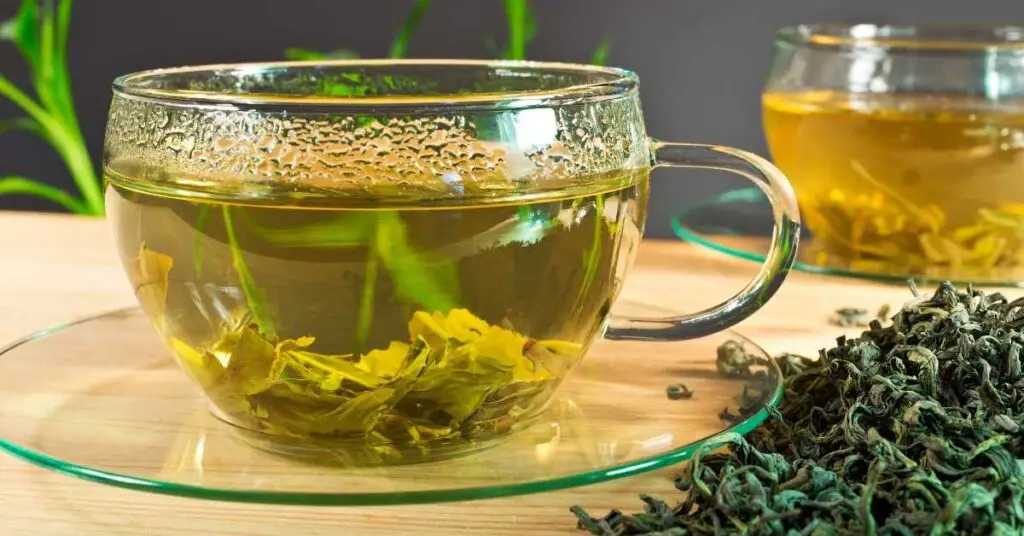Green tea is a type of tea that is made from the Camellia sinensis plant. The leaves are withered and then steamed, which stop the oxidation process that turns the leaves black. Green tea has been consumed in China for thousands of years and is now enjoyed all over the world. Unlike black tea, green tea does not undergo fermentation, so it retains its original color and flavor. Green tea is rich in antioxidants and has been linked to several health benefits, including a reduced risk of heart disease and cancer. Although green tea contains caffeine, it is lower than the amount found in coffee. For those looking for a refreshing and healthy beverage, green tea is a great choice.
It’s a common misconception that all green teas are naturally caffeine-free. While it’s true that green tea does contain less caffeine than other types of tea, there is still a small amount of caffeine present.
However, the amount of caffeine in green tea can vary depending on how it’s brewed. For example, if you steep your green tea for a shorter period of time, there will be less caffeine present. If you’re looking for a completely caffeine-free option, there are plenty of herbal teas to choose from. Peppermint, chamomile, and ginger tea are all excellent choices that are naturally caffeine-free.
How much caffeine does green tea normally contain?
Green tea is a type of tea that is becoming increasingly popular due to its many health benefits. One question that people often have about green tea is how much caffeine it contains.
The caffeine content in green tea falls mid-range with 35 to 45 milligrams per eight ounce serving. While it is definitely less than black tea, it is still higher than other types of tea, such as white tea. Caffeine is known to have stimulating effects on the body, so it is important to be aware of the amount you are consuming. If you are sensitive to caffeine or are trying to avoid it for other reasons, green tea may not be the best choice for you. However, if you enjoy drinking caffeinated beverages and are looking for a healthy option, green tea is a great choice.
The effects of caffeine on the body
Caffeine is a stimulant that can have both positive and negative effects on the body. Some of the potential benefits of caffeine include increased alertness, improved mood, and increased physical performance. Caffeine can also help to temporarily relieve headaches.
However, there are also some potential side effects of caffeine, such as anxiety, restlessness, and difficulty sleeping. It is important to be aware of these potential effects before consuming caffeine, especially if you are sensitive to it.
If you decide to drink green tea, be aware of the amount of caffeine it contains so that you can avoid any unwanted side effects. If you are looking for a completely caffeine-free beverage, there are plenty of other options to choose from. Peppermint, chamomile, and ginger tea are all excellent choices that are naturally caffeine-free.
How to reduce caffeine in green tea?
If you are looking to reduce the caffeine in your green tea, there are a few things you can do.
- First, Skip the coffee house green teas. These tend to be higher in caffeine.
- Second, opt for decaffeinated green tea. This will help to reduce the amount of caffeine you are taking in.
- Third, drink green tea blends. This will help to reduce the caffeine content of the tea.
- Fourth, brew green tea correctly. This will help to reduce the amount of caffeine that is released into the tea.
- Fifth, drink whole-leaf green tea instead of green tea bags. This will help to reduce the amount of caffeine that is released into the tea.
- Sixth, drink less tippy green teas. This will help to reduce the amount of caffeine that is released into the tea.
- Seventh, drink ‘twig teas.’ This will help to reduce the amount of caffeine that is released into the tea.
- Eighth, drink green teas that are not shade-grown. This will help to reduce the amount of caffeine that is released into the tea.
- Ninth, avoid powdered green teas. This will help to reduce the amount of caffeine that is released into the tea.
- Tenth, avoid pre-brewed green teas. This will help to reduce the amount of caffeine that is released into the tea.
These are just a few tips to help you reduce the amount of caffeine in your green tea.
How to make green tea?
Brewing green tea is simple and only takes a few minutes. The following is a basic guide on how to brew green tea.
First, you will need to bring some water to a boil. The amount of water you need will depend on how many cups of tea you want to make.
Next, take your green tea leaves and place them in a teapot or teacup.
Then, pour the hot water over the leaves and let them steep for 3-5 minutes.
After the leaves have steeped, you can then strain them and enjoy your cup of green tea.
Green tea can be enjoyed plain or with a bit of honey or lemon. If you are looking for a more flavorful cup of tea, you can also add some herbs or spices.
The best time of day to drink green tea
The best time of day to drink green tea is in the morning or early afternoon. This will help to improve your alertness and energy levels.
If you are trying to avoid caffeine, it is best to drink green tea earlier in the day so that you can sleep better at night.
How much green tea should you drink each day?
There is no set amount of green tea that you should drink each day. However, it is generally recommended to drink 3-5 cups per day.
If you are new to drinking green tea, start with 1 cup per day and gradually increase your intake.
What are the benefits of green tea?
The health benefits of green tea
- Weight loss – Green tea can help to boost your metabolism and burn fat.
- Lower risk of cancer – Green tea contains antioxidants that can help to protect against cell damage and reduce your risk of cancer.
- Reduced risk of heart disease – Green tea can help to lower your cholesterol levels and improve your blood pressure.
- Improved brain function – Green tea can help to improve your memory and concentration.
- Lower risk of diabetes – Green tea can help to regulate your blood sugar levels.
These are just a few of the many benefits of green tea. If you are looking for a healthy beverage to add to your diet, green tea is a great choice.
Conclusion
Green tea is a nutritious and invigorating drink with several advantages. Green teas, however, are not all made equal.If you want to avoid caffeine, decaf green tea or green tea blends are your best bet. Green tea can also help you reduce the amount of caffeine in your finished cup if prepared correctly. Finally, keep in mind that green tea should be consumed in moderation. Excess green tea may induce side effects such as headaches, sleeplessness, and irritability.If you want a delicious, healthy drink to add to your diet, green tea is theperfect choice. You may be surprised at how great it tastes and how good it makes you feel.












